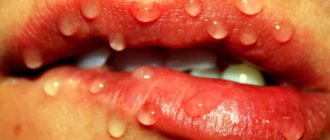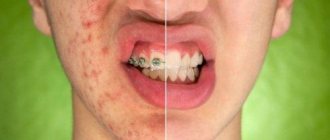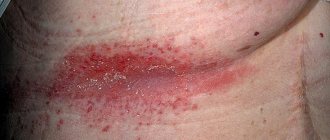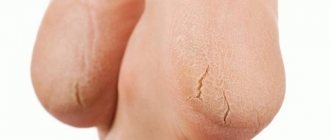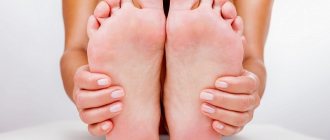Ulcers and pimples in the mouth: possible causes, diagnosis and treatment methods
The appearance of pimples and ulcers in the mouth usually indicates some problems associated with the condition of the teeth or gums, and problems with the functioning of internal organs and systems. There are very, very many possible causes for this symptom, so self-diagnosis in this case is almost impossible. However, based on the nature of the rash, some assumptions can sometimes be made. So, for example, watery neoplasms are most often of a viral nature, while red and white ones are bacterial. In any case, there is no way to do this without the help of a specialist. We’ll talk about what causes mouth ulcers and what this might mean specifically in your case later in this article.
Rashes in the mouth - what does it mean?
Neoplasms can have different localizations - they appear on the gums, the inside of the cheeks, on the palate and under the tongue. At the same time, the accompanying symptoms and, accordingly, further treatment depend on what caused their appearance.
For example, there are blisters that arise as a result of a thermal burn, and such defects usually go away on their own and do not require outside intervention. However, painful rashes more often indicate the presence of a pathological process in the oral cavity or even outside it. To find out the exact cause of their appearance, a professional diagnosis from a doctor is required.
Varieties
There are quite a few types of acne on the palate. Each of them is characterized by certain features.
Red
Such pimples usually affect the throat area and may indicate stomatitis, allergic reactions, or scarlet fever. The rash can also be a symptom of lupus erythematosus.
Read how to treat watery pimples on a child’s face. How to remove acne spots? More details here.
White
Such formations affect the mucous membranes of the oral cavity in infectious pathologies. These include the chronic form of tonsillitis, candidiasis, viral or bacterial stomatitis.
Solid
An internal pimple with a hard consistency often accompanies angioma. This dental disorder can have several types and is a benign tumor lesion of a blood vessel. It is associated with the expansion and appearance of new blood vessels.
The formation is called a true angioma and is accompanied by the appearance of a compaction on the palate. In addition, angioma is isolated that affects the lymph nodes. However, this form of the disease is observed much less frequently.
Types of rashes and ulcers on the oral mucosa
It is almost impossible to independently understand what caused the formation of tumors in the mouth. This symptom is characteristic of a huge number of different pathological conditions. But it is still possible to make assumptions, and for this you need to carefully study the appearance of the manifestations, as well as take into account the accompanying symptoms.
White pimples on the mucous membrane
White pimples that appear one at a time may be the result of an accidental thermal burn or mechanical damage. Over time they will go away on their own. In the meantime, it is better not to touch them, and under no circumstances should you try to bite or pierce them - the risk of infection is too great.
The photo shows white pimples
Another possible cause of whitish rashes is candidiasis (thrush). The pathology can be provoked by constant tissue injury from an uncomfortable prosthesis, a sharp drop in immunity, or taking potent drugs, including antibiotics. As the disease develops, the mucous membrane usually becomes covered with a dense white or grayish coating. Appropriate treatment is required.
Watery bumps and red sores
This is a separate type of neoplasm in the mouth, which is characterized by its own etiology. The cause of watery blisters on the mucous membrane can be one of the following diseases:
- herpetic stomatitis,
- vesical vascular syndrome - usually develops due to a violation of the integrity of the vessel with high blood pressure,
- Dühring's dermatitis herpetiformis - occurs against the background of intestinal disturbances,
- exudative erythema multiforme is a disease of infectious-allergic or toxic-allergic origin, in severe cases painful blisters appear,
- pemphigus is a consequence of a problem with the immune system,
- Epidermolysis bullosa is a rare genetic disease that manifests itself in infancy.
The photo shows herpes.
This is only a small part of the possible prerequisites. As mentioned above, a white, watery blister can appear as a result of an accidental burn from food and drink that is too hot. If the burn causes serious discomfort and pain, it is better to rinse your mouth with an antiseptic and consult a doctor.
As for red ulcers, such rashes are characteristic of herpes, aphthous stomatitis and even syphilis. They are usually painful, uncomfortable, and may bleed. In another case, red sores arise as a consequence of the development of measles, an infectious disease characteristic primarily of childhood. Red pimples with a white bump in the center first appear in the mouth and after a while begin to appear on the skin.
New growths of a purplish-bluish hue
The appearance of dark blue spots in the mouth most often indicates the occurrence of a hematoma. The cause may be a mechanical injury, in which case the defect will go away on its own in a few days.
An angioma or vascular tumor is also dark in color, but has other symptoms. For example, if you press on it, a slight pulsation occurs. Pathology poses a serious danger when the integrity of the tubercle is violated.
This is what an angioma looks like
Another possible option is smoker's melanosis. With the development of this pathological condition, dark brown dots appear on the mucous membrane. With adrenal dysfunction (Addison's disease), a hormonal imbalance occurs, which can result in the appearance of black elements with a bluish tint. True, this symptom is quite rare.
Purulent acne
Purulent neoplasms usually arise due to the development of bacterial stomatitis. They can be triggered by streptococcal and staphylococcal infections. In different cases, pustules appear separately or can merge with each other. Patients almost always complain of severe itching and pain.
Purulent formations may be a consequence of bacterial stomatitis
But a serious internal disease, such as tuberculosis, can also lead to the appearance of purulent pimples in the mouth. Small pustules are usually concentrated around a firm ulcer, which is painful and contagious.
Rash at the corners of the mouth
A small rash that is localized in the corners of the mouth usually does not cause concern in patients, but this is where the serious danger lies. The problem can be caused by simple irritation, for example, due to increased salivation, or serious drug or alcohol poisoning, prolonged stress and depression. Diagnosis and treatment require an integrated approach.
Characteristics of a blood bubble on the oral mucosa
The mucous membrane protects the entire body from the negative influence of the environment, from harmful microorganisms, various types of pollution, and also has a fairly high level of regeneration. If blood blisters regularly appear on the oral mucosa, then you should take this signal seriously and take action.
A bloody ball in the mouth is a hematoma (bruise), which is characterized by the accumulation of blood in a certain place in the oral cavity. The appearance of bloody blisters is a kind of hemorrhage that occurs due to trauma to the capillaries and thin vessels of the mucous membrane.
A blister on the mucous membrane may contain clear serous fluid without the presence of blood. This means that the vessels were not damaged and the resulting wound is superficial. Such blisters on the mucous membrane heal much faster. The presence of blood in the bladder indicates a deep injury and a longer period of healing and blood resorption.
Why ulcers and pimples may appear - possible causes
Obviously, there are a huge number of reasons for the appearance of pustules in the mouth. This symptom often develops against the background of dental diseases. Read more about this category of prerequisites below.
Aphthous stomatitis
Stomatitis, and especially its aphthous form, is one of the most common causes of the appearance of ulcers on the mucous membrane. This is a pathology of a chronic type and inflammatory nature. One of its main features is periodic exacerbations. Small ulcerations appear on the inner surface of the cheeks, on the palate, tongue or mucous surface of the lips. The rashes are painful, cause anxiety and take quite a long time to go away - from 10 days to 2-4 weeks.
The photo shows the aphthous form of stomatitis
“And I constantly get these ulcers, a very unpleasant thing! They hurt, especially when on the tongue. I never treated them with anything, they went away on their own. When I told the dentist, it turned out that I had chronic stomatitis. He advised me to treat them with brilliant green and rinse my mouth with a soda solution. I also discovered Cholisal-gel for myself, it helps me a lot.”
There are quite a few potential prerequisites for the development of aphthous stomatitis. This could be a sharp decrease in immunity, severe emotional stress, hormonal changes, or a banal mechanical injury to the mucous membrane.
Herpetiform stomatitis
Herpetiform stomatitis is also characterized by the appearance of small ulcers, but in large quantities. Externally, the rashes are similar to manifestations of herpes. According to statistics, women under the age of 30 are especially susceptible to stomatitis herpetiformis1.
This form often forms under the tongue
Often, neoplasms appear under the tongue and on the surface of the floor of the mouth. They do not have a clear shape, but flake off with a grayish base. Such ulcerations heal in about 10 days and sometimes leave scars. A mild form of stomatitis herpetiformis is often observed in childhood. Vitamin C is often recommended as part of treatment.
Setton's aphthae as a type of stomatitis
A more complex type of stomatitis, and at its initial stage, seals often appear in the mouth. Later they develop into painful ulcers with fairly dense and raised edges. Such neoplasms are usually filled inside with lymph mixed with blood. They can be localized on the inner surface of the cheeks, the mucous membrane of the lips and the lateral surfaces of the tongue. They cause pain when eating and talking. They take quite a long time to heal – up to several months.
This is what Setton's aphthae look like
Bednar's aphthae - erosions
We are talking about an erosive lesion, which most often has a traumatic nature. The pathology is typical for childhood. The reason for its development may be frequent and abundant salivation, rough mechanical impact on the mucous membrane of the palate, or poor hygiene. Such ulcers usually have a yellowish coating on top, and they themselves appear on the hard or soft palate.
Bednar's aphthae mainly occur on the palate
Traces of injuries
We have already mentioned neoplasms of traumatic origin above, now we will dwell on them in a little more detail. Possible reasons for their appearance include the following:
- accidental biting of the mucous membrane,
- injury caused by vigorous brushing with a stiff bristle brush,
- inaccurately performed dental treatment,
- permanent injury from uncomfortable dentures or braces, incorrectly or poorly installed fillings and crowns,
- thermal and chemical effects on the mucous membrane.
Constant injury from braces can lead to problems.
Typically, such neoplasms are small in size and go away on their own after a short time. It takes 1 to 2 weeks to heal. However, if the injury is serious, you should definitely see a doctor.
Symptoms
- Painful sensations when eating occur if a bubble has formed in the gum area or on the tongue;
- Pain when talking or smiling appears when a formation occurs on the inner surface of the lip;
- Pain in the throat area occurs if the bubble is located at the root of the tongue.
Transparent and bloody blisters can be not only inflammatory in nature. If the formation does not cause pain and is not accompanied by swelling, then you should consult a dermatologist. It is not recommended to treat yourself in such a situation, as it can be dangerous to health.
Neoplasms as a symptom of systemic pathology
Serious systemic disorders can also lead to the appearance of ulcerations. Such pathologies of internal organs include the following diseases.
Tuberculous aphthae
The development of the disease is often accompanied by the appearance of multiple irregularly shaped aphthae. Such rashes can appear on any part of the oral cavity. In this case, the ulcers can grow in width and cause serious pain. The patient's temperature and sweating increase, and their general condition worsens. In such a situation, appropriate therapy in a hospital setting is required.
Syphilis and ulcers
In this case, round ulcers with infiltrate may appear on the mucous membrane. As a rule, they occur towards the end of the incubation period and remain until complete recovery. Red with a dark coating, they are usually located on the palate. In this case there is no pain. Treatment is carried out in venereology hospitals.
The photo shows ulcers from syphilis
Endocrine system disorders
Failures in the endocrine system often lead to the appearance of whitish pimples that are small in size and completely painless. Such rashes take a long time to heal, which is usually associated with weakened immune defenses of the body. A similar symptom also often appears against the background of disturbances in the gastrointestinal tract, chronic renal failure and after chemotherapy.
Other reasons
Pimples on the mucous membrane can also be a reaction of the body to various irritants. In this case, the cause may be one of the following:
- side effects of medications, including drugs that reduce the production of salivary fluid and diuretics,
- lack of vitamins and poor nutrition - deficiency of vitamins B and A in particular,
- abuse of toothpastes and rinses containing sodium lauryl sulfate - the component dries out the mucous membranes,
- hormonal imbalances, for example, during menstruation or menopause,
- general dehydration of the body,
- genetic pathologies, etc.
Nicotine and alcohol addiction also lead to various types of rashes. As you can see, there are a huge number of potential causes, so an appropriate examination is required to make an accurate diagnosis.
How to cure the disease
It should be remembered: you should not self-medicate if the seal on the inside of the lip in the mouth is very painful, bleeds or produces pus. In addition, you cannot squeeze pimples near your mouth or puncture them. Symptoms are a signal of the development of infectious diseases that should be treated under the supervision of a doctor. In other cases, it is also recommended to consult a specialist for examination and diagnosis. Typically, patients are prescribed a general blood test, urine test and a throat swab. Based on the examination results, the doctor will tell you how to treat the identified disease.
To get rid of damage in the mouth on the gums, there are various means that you need to regularly treat the affected cavity. The following types of medications are used:
- herbal decoctions;
- solutions;
- oils;
- ointments and gels;
- powders.
If the body is infected with fungi, it is necessary to take tablets. If the cause of a rash in the oral cavity is infectious diseases or pathologies of internal organs, then first you need to get rid of them. As a rule, rashes around the mouth go away on their own after some time and do not require additional medications.
Herbal decoctions will have a positive effect in mild cases that do not hurt. Oak bark, celandine, nettle and chamomile will help remove plaque on the tongue or cheeks and relieve inflammation. Treatment can be carried out with a solution of chlorophyllipt, as well as warm water with sea buckthorn oil. Fungal infection can be cured using antiseptics - Rotokan or potassium permanganate. In addition, you should take Fluconazole or Nystatin and treat the affected areas with clotrimazole-based ointment. For purulent pimples in the mouth, you should resort to rinsing your mouth with a solution of soda or furatsilin. These products disinfect mucous membranes, draw out fluid and dry out ulcers.
Sea buckthorn oil promotes cell regeneration and hydration of the mucous membrane. It can be used either as a solution with warm water or in its pure form. Apply with a cotton swab to pimples on the palate of an adult 5-6 times a day.
Sakania Luiza Ruslanovna
Dermatovenerologist, cosmetologist, trichologist
Ask a Question
A watery pimple on the outside or inside of the lips that is itchy and painful is recommended to be treated with Tetracycline powder. The drug perfectly dries out inflammation in the corners of the mouth, promoting rapid healing.
Herpes infection is treated with special ointments or solutions. The most effective are Acyclovir, Tetracycline, Alpizarin or Gossypol. Before applying the cream or gel, it is better to rinse your mouth with an antiseptic to ensure maximum penetration of the product to the lesions.
For the treatment of advanced infections, in which pimples appear in the mouth on the cheeks or tongue, a set of measures is used. They are aimed at removing pain and restoring the cavity. It includes the use of medications for the underlying disease, treatment of ulcers with antimicrobial (or antifungal) ointment, rinsing or lotions from medicinal decoctions, as well as immunotherapy to increase the body's defenses.
To ensure that the treatment process does not drag on for a long time, it is worth changing your diet and oral care. You will have to forget about all the products that cause acne on the mucous membrane. Such foods include citrus fruits, sweets, spicy seasonings, sour fruits or berries (or juices from them), crackers and other solid foods. It is recommended to brush your teeth with a toothpaste without alcohol and menthol, otherwise during the procedure there will be burning and bleeding near or inside the mouth.
Lack of which vitamins can cause rashes?
In some cases, an acute lack of vitamins and poor nutrition can also lead to the appearance of tumors on the mucous membrane. To date, it has been scientifically proven that a deficiency of vitamins B and A in the body is one of the possible causes of painful rashes. To find out the exact cause, you will have to undergo a diagnosis from a specialist. Starting to take vitamin complexes on your own when such a symptom appears is not the best solution. Such an initiative can result in negative consequences, including the development of hypervitaminosis, and this condition is fraught with serious complications.
Lack of vitamins can cause formations in the mouth
The mechanism of formation of a blood bubble on the oral mucosa
Bloody blisters in the mouth in most cases are not life-threatening. They are formed as a result of mechanical damage to the mucous membrane. When microtrauma occurs, harmful microorganisms attack the damaged area.
After this, a number of responses are activated in the human body:
- The immune system is activated. Monocytes and leukocytes, as well as macrophages, instantly arrive at the damaged area, attacking the harmful pathogen and quickly destroying it.
- Immune cells die. This is a signal for other cells and substances are released in the affected area that are mediators of inflammation of the mucous membrane - serotonin, histamine and bradykinin.
- These substances cause a strong spasm of the circulatory system and the outflow of blood is hampered. After the spasm is relieved, all accumulated blood immediately flows to the site of inflammation. It moves at high speed and under pressure. A detachment of the mucous membrane occurs in the mouth, and a bloody blister appears.
How is treatment carried out in dentistry?
To quickly cure rashes, you first need to find out the name of the disease that led to their appearance in the mouth. There is no way to do this without the help of a specialist. Above, we have already found out why ulcerations on the mucous membrane can appear in adults. But to make an accurate diagnosis in each specific case, you should undergo a full comprehensive examination.
To find out the cause of the problem, you may need to consult not only a dentist, but also other specialized doctors. Next, a comprehensive treatment is carried out, which, as a rule, includes complete sanitation with the mandatory elimination of foci of infection and all traumatic factors. Additionally, professional cleaning of plaque and deposits is prescribed. Next, the doctor begins to treat the tumors:
- first you need to treat the rash with an antiseptic solution,
- to stop the disease, dexamethasone or lidocaine is used - applied externally,
- after this, the aphthae are treated with an enzymatic preparation based on trypsin and vitamin B12,
- Nystatin is sometimes also used.
After all the manipulations performed, general treatment is carried out. Depending on the source of the problem, the doctor may prescribe antihistamines, for example, Tavegil or Suprastin. In other cases, desensitizing agents, such as Fenkarol, are prescribed - they need to be smeared to stimulate the healing process. You may also need to use corticosteroid ointments with vitamins C and P.
In more serious cases, antibiotics are prescribed. Anti-inflammatory gels and ointments, such as Cholisal and Kamistad, are widely used. Antibacterial sprays, including Ingalipt and Proposol, can also be effective. The patient uses all these drugs independently at home, but the appropriateness, dosage and frequency must be agreed with the doctor. If you follow all his recommendations, removing even painful rashes will not be difficult. The main thing is to find the cause and direct maximum efforts to eliminate it.
Pimples on the palate: causes
Inflammatory processes in the oral cavity are provoked by the reaction of the human immune system to microorganisms foreign to it. Experts identify a general name for such pathological formations in the mouth - stomatitis.
Stomatitis can appear as a result of various irritants, depending on the etiology of which, several types of this pathology are distinguished:
- with bacterial infection;
- with herpetic lesions;
- as a result of an allergic reaction;
- other species that are less common.
Experts also distinguish three types of acne that occur on the oral mucosa, which are observed in most cases:
- translucent bubbles containing a clear liquid inside;
- plaques are white, often have a lumpy, rough structure, visually somewhat reminiscent of warts;
- small pimply pimples that appear on the palate.
In most cases, all kinds of pimples and pimples on the roof of the mouth appear as a result of foreign bacteria entering the oral mucosa. This can be caused by mechanical damage, such as a bite, scratch, and sometimes it can even be an injection during dental procedures.
Pimples that appear on the palate can cause pain, discomfort, they can become irritated and turn red. If the plaques are filled with fluid, then after a few days the bubbles burst and the fluid comes out. In general, it takes about 5-7 days for the immune system to fight this kind of acne in the mouth. This period is enough for the human immune system to overcome pathogenic bacteria, and the symptoms of stomatitis are reduced to a minimum.
Red bumps on the roof of your mouth are a common sign of an allergic reaction. This kind of neoplasm does not cause any danger, however, allergies can provoke quite painful plaques in the mouth, so it is important to determine in time which allergen provoked the allergic reaction and determine the method of treatment, together with the attending physician.
If, along with the formation of pimples in the mouth, you notice hyperemia (increased body temperature), inflammation of the lymph nodes, and severe discomfort and pain occur when eating, then a herpetic type of stomatitis may have developed. In this case, it is better to consult a doctor as soon as possible so that he can prescribe a suitable treatment method.
It is better not to self-medicate and not to delay visiting a doctor, otherwise life-threatening complications may result.
Another type of pimples in the mouth is white pimples, which are caused by a fungal infection. If left untreated, the fungal infection can spread to the digestive system and other organs. Formations after such acne in the mouth can be associated with such serious pathologies as syphilis, lupus erythematosus, and so on. These are diseases in which the human body begins to attack its own immune system.
Features of the appearance of ulcers and therapy in a child
When mouth ulcers appear in a child, you first need to find out what caused them. Only after this the doctor will be able to tell how to remove them and how to treat the pathological condition. But usually the therapy is not very different from the treatment of similar conditions in adults. However, there are strict age restrictions when prescribing some antibiotics, strong ointments and benzocaine-based products. Therefore, the doctor prescribes medications taking into account the child’s age.
Anti-inflammatory and aseptic agents are usually applied after application anesthesia. For this, doctors recommend lidocoine-based gels. Antifungal medications may be prescribed for rinsing. If the child is still too small to rinse on his own, therapy is limited to ointments with a similar effect. As symptomatic therapy, experts often recommend solutions and pastes with baking soda. During treatment you will have to follow a special diet and focus your efforts on improving immunity.
Rinses may be prescribed for treatment.
In any case, the vector of treatment will directly depend on the source of the problem. Therefore, immediately after the appearance of suspicious tumors, it is necessary to show the child to a specialist.
Photo: Nature of the rashes
The formation of pimples on the palate may be evidence of dental or infectious pathologies.
See how to treat acne on a woman’s face. How to remove acne scars on the face? Find out further.
How to remove acne marks on the face?
The answer is here. For treatment to be effective, the provoking factor must be identified. To do this, you need to conduct a comprehensive examination of the body.
Prevention - how to prevent relapses
Often, rashes appear and go away on their own several times a year. To minimize the risk of such relapses, experts recommend taking note of a few simple recommendations:
- promptly treat dental diseases and eliminate traumatic factors in the oral cavity,
- follow all hygiene rules, regularly brush your teeth with a properly selected brush and toothpaste,
- approach the use of antiseptic rinsing solutions wisely - it would be a good idea to consult your dentist about this,
- pay attention to your diet, limit foods high in aggressive acids and potential allergens,
- increase the consumption of healthy foods rich in vitamins and vital microelements.
Proper oral hygiene is important to maintain your smile.
It is important to take care of your health and respond promptly to any suspicious changes in your condition. Visit your dentist regularly for preventive care, and also do not forget to get tested and undergo preventive examinations from other specialized doctors from time to time.
Preventive measures
It is possible to avoid relapse of pathology by adhering to simple rules. The most important thing is to maintain hygiene. You need to brush your teeth and cleanse the mucous membranes of dirt 2 times a day; if possible, use balms to rinse the cavity after meals. You need to change your toothbrush at least once every 2-3 months, giving preference to soft bristles. It is recommended to choose cleaning products without sodium lauryl sulfate and alcohol. If you experience any discomfort, it is important to contact your dentist in a timely manner and correct the problem.
You need to pay special attention to nutrition. Frequent consumption of spicy, hot and hard foods provokes small wounds through which infection penetrates and causes inflammation. Under no circumstances should you squeeze a pimple in your mouth on your lip or burn it with anything! Such actions only cause deterioration and do not get rid of the problem.
Rashes on the cheeks, tongue or under the lip do not just appear. A watery pimple in the mouth can be caused by improper care or diseases of the internal organs. An illness that is not accompanied by pain, itching and plaque can be overcome on your own. To do this, you need to use herbal decoctions or antiseptic solutions. If the white pimples in the mouth bleed, itch and are very painful, then seeing a doctor is a must.
You can ask your question to our author:
When to see a doctor
To get rid of aphthae, you definitely need to visit a doctor. If they do not go away within 2-3 days, if the cause of their appearance is not a thermal burn, it is better to seek help from a specialist as soon as possible. The sooner he finds out the problem and makes a diagnosis, the easier and faster the treatment will be. You should not wait even a few days if the appearance of ulcers is accompanied by rashes not only in the mouth, but also in other parts of the body, if the temperature rises, nausea, vomiting and diarrhea appear.
Pimples and ulcers on the mucous membrane are quite common. They may go away on their own in the near future, but a visit to the doctor in any case will not hurt. It will be worse if the pathological process develops into a severe chronic form, which will require serious and long-term treatment.
1According to WHO statistics.
When can you use Azelik®?
Acne rarely occurs on the edges of the lips, since the smallest number of sebaceous glands is located there. More often, acne affects the chin, forehead, cheeks, and spreads to the décolleté, shoulders, and back.
One of the medications indicated for mild to moderate acne is Azelik® gel. Its main active ingredient is azelaic acid. It has the following properties5:
- helps normalize disrupted keratinization processes in the pilosebaceous follicle;
- helps reduce the level of free fatty acids on the skin;
- exhibits antibacterial activity against propionibacteria and Staphylococcus epidermidis;
- has an anti-inflammatory effect due to its ability to reduce neutrophil metabolism and reduce the synthesis of free radical oxygen species.
Azelik® gel must be applied twice a day5. 2.5 g of preparations are enough to treat the entire face5. The gel is available in tubes of 5, 15, 30 g.



